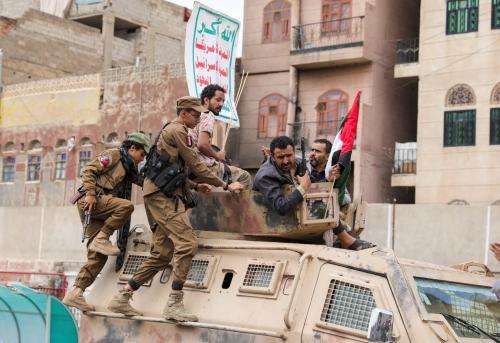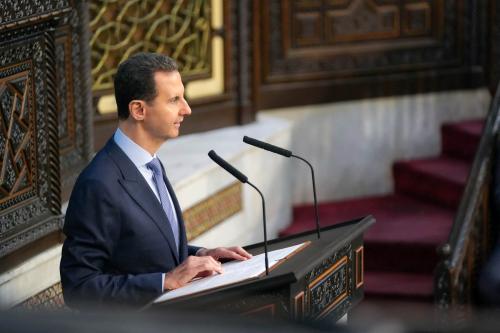

12:30 pm EST - 2:00 pm EST
Past Event
12:30 pm - 2:00 pm EST
1775 Massachusetts Ave., NW
Washington, DC
The Saban Center for Middle East Policy hosted a policy luncheon on November 29, 2007 entitled “Upgrading Authoritarianism in the Arab World,” launching a Saban Center analysis paper of the same name. The author, Steven Heydemann, a former Saban Center non-resident Senior Fellow and currently Associate Vice President of the U.S. Institute of Peace, presented a summary of the paper’s arguments; Kenneth Wollack, President of the National Democratic Institute, served as the respondent. The event was chaired by Tamara Cofman Wittes, Senior Fellow and Director of the Project on Middle East Democracy and Development.
Heydemann proposed that the defining trend in Arab politics today is a phenomenon he termed authoritarian upgrading. Authoritarian upgrading is a new framework of authoritarian governance that has emerged from a series of ad hoc changes and adjustments made by authoritarian regimes responding to pressures for political reform. Upgraded authoritarianism is not due to deliberation or foresight on the part of the regimes, he emphasized; rather, it resulted from a process of trial and error, as regimes sought to respond to the pressure to reform without ceding any of their substantive authority. Some responses also derived from Arab regimes observing and adapting the experiences of regimes outside of the region, in a process Heydemann termed “authoritarian learning.” The institutions and patterns of behavior developed in these responses have enabled Arab regimes to emerge from under these pressures in some ways stronger and more complex than before.
Heydemann described five key features of authoritarian upgrading: appropriating and containing civil society organizations; managing political contestation; capturing the benefits of selective economic reforms; controlling telecommunications technologies; and increasing international linkages between regimes. Heydemann suggested that, because of the adaptability regimes have demonstrated through authoritarian upgrading, current Western democracy promotion strategies may have reached the limits of their effectiveness in these environments. The democracy promotion community, he argued, has come to rely on tried-and-true strategies—electoral reform, political party reform, strengthening civil society organizations—that Arab regimes have become able to deflect or absorb, using the programs instead to sustain themselves in power.
Heydemann proposed an alternative framework for democracy promotion in the region that takes into consideration the ways in which authoritarian upgrading has changed the political environment. This new framework capitalizes on four key aspects of this new terrain. These include the fact that the regimes struggle to manage the larger governing coalitions they have assembled; the growing cynicism among Arab populations about the value of political participation; the recognition by Islamist movements of the limited gains achieved by political participation; and the opportunity before the U.S. to improve the coherence of its policy toward reform in the region. Heydemann suggested that these features created opportunities for new forms of American democracy promotion, but these would require a stronger governmental and diplomatic role than in the past.
Kenneth Wollack agreed with Heydemann that certain regimes in the Arab world have learned to adapt to many democracy promotion efforts in the region. He argued, however, that democracy promotion in the Arab world has been a relatively recent phenomenon, and that input from indigenous activists would demonstrate that the United States was not a real presence in regional democracy struggles until a few years ago. Given this, he said, it is too early to evaluate such efforts. He pointed to the changing language of debate in the region—in which the actions of Arab regimes are measured by how well they accord with democratic norms—as a sign of progress on the reform front. He also cautioned against the possibility that emphasizing the limits of current democracy promotion tactics might lead to an unfortunate prescription for inaction, as opposed to greater engagement, on the part of the United States and the West.
Several participants asked questions concerning the future of American democracy promotion efforts in the region, as well as questions about the opportunities afforded by succession in countries such as Egypt. Addressing the first set of questions, Heydemann said that a debate about whether or not American democracy promotion will continue to take place is the wrong kind of debate to be having. Rather, he suggested that debate should focus on how democracy promotion efforts could be structured so as to preserve the efficacy of external pressure to advance reform. Regarding political successions, he said that they generally do not present opportunities for reform, since the government experiencing the succession prioritizes stability and is likely to resist calls for reform until achieving an adequate level of stability.

Allison Minor
September 3, 2024

Shibley Telhami
August 27, 2024

Karam Shaar, Steven Heydemann
August 26, 2024